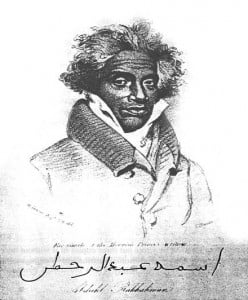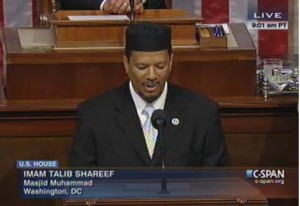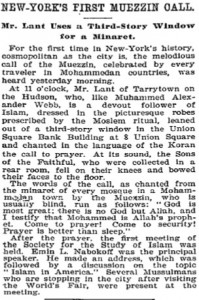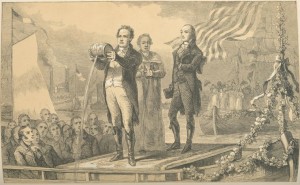Muslim History Detective’s log, 05/30/13
On October 4, 1865, the anti-slavery, Tunisian Muslim General Otman Hashem arrived in New York via the steamship Persia. The very next day, the New York Times reported his stay in the city to be a one day rest stop before moving on to his intended destination of Washington, DC. But wouldn’t you know it, given how “colorful” New York City is, the stopover morphed into quite an eventful, days-long tour of the city, full of vibrant engagement with its residents and officials.
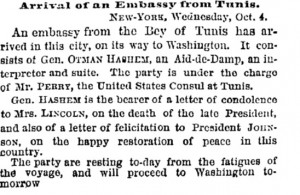
Gen. Hashem had come to the United States, representing His Highness the Bey of Tunis, to convey to President Andrew Johnson, and the American people, condolences on the tragic assassination of President Lincoln and congratulations on the end of the “calamitous” Civil War.
I have written very briefly before about these reasons behind the general’s visit to the United States, but I have not shared, in any detail, how New York newspapers extensively covered the general’s stopover in the city before he proceeded on to Washington, DC to meet with the president.
A couple of days ago I wrote about how, as a Muslim History Detective, I always feel like a kid in a candy store wherever I turn in New York because of the centuries of amazing connections to the history of Islam and Muslims in America that can be found in this luminous city.
So, how about we briefly explore a few choice nuggets of history regarding media coverage of Gen. Hashem’s visit there that further underscore this point?
For example, the New York reporting on the general’s visit highlighted how well he was received and hosted, including an excursion to Central Park; going to the opera at the Academy of Music, which used to be located at East 14th Street and Irving Place in Manhattan; and touring the Brooklyn Navy Yard, full with a drum-roll welcome for him. Marines were even lined up to present arms in a show of respect for the distinguished general.
A visit with the mayor at City Hall in Manhattan was also documented. The meeting went so well that the mayor allowed Gen. Hashem to serve as a witness at a marriage ceremony he was officiating that day and even had the Muslim sign his name in Arabic on the marriage certificate.
(I would love to track down a copy of that certificate, let me know if you beat me to it!)
We also know from newspaper reports that the general even had a chance to witness some of the charitable efforts for destitute and troubled children taking place on Manhattan’s Randall’s Island, where he had been invited by the New York Commissioners of Charities and Corrections.
In welcoming remarks, addressing the Muslim, one of the youth captured the fascination of the visit for them all:
“You have traveled many thousand miles from your land of the sun, and the mosques, and have come on a mission of condolence and friendship from your high and mighty master to the President and people of the United States.”
Regarding the visit to the island and the resources made available to those in need there, Gen. Hashem later remarked:
“A people that are so charitable must enjoy the special favor of God.”
When Hashem finally made his way to Washington DC, he met with President Andrew Johnson at the White House. The DC visit was also covered extensively in New York papers.
During the meeting, which took place in the Blue Room, President Johnson acknowledged the anti-slavery perspectives of his Muslim guest and reflected on the United States’ current challenge around liberty post-Civil War.
The president declared, in part:
“You are favorably known to us as a soldier and a scholar, and, above all, as a statesman devoted to the extinction of slavery. You will be able to report to His Highness the Bey that the American nation are trying a humanitarian experiment. It is nothing less than this: Whether a people can save liberty and at the same time govern itself.”
Interestingly, this all took place before slavery was constitutionally outlawed by the ratification and adoption of the Thirteenth Amendment.
Gen. Hashem seems to have been quite taken with his experiences in our country, once even stating, in response to concern about how far he and his entourage had to travel to get here, that “the congeniality and hospitality they had met with in the United States would make them forget twice the distance.”
There is much more to be shared about the Muslim general’s visit to the United States. But I have learned that part of the joy in detective work is leaving clues to be uncovered for another day—even though it is hard not to history binge and tell it all at once!
So, I will not talk to you today about the very sympathetic and benevolent letter, from the Bey of Tunis, to the widowed Mrs. Lincoln that Gen. Hashem had to deliver.
I will not speak of the general’s very interesting visit to Harvard and Brown.
I will not get into details about the reception held in his honor at Boston City Hall, hosted by the city’s mayor, nor will I discuss the letter the general wrote, upon his return home, to the American Ethnological Society wherein he expressed that he was “deeply interested in the history and amelioration of the different races of the globe.”
These, and so much more, are all clues to explore perhaps another day, God willing!


